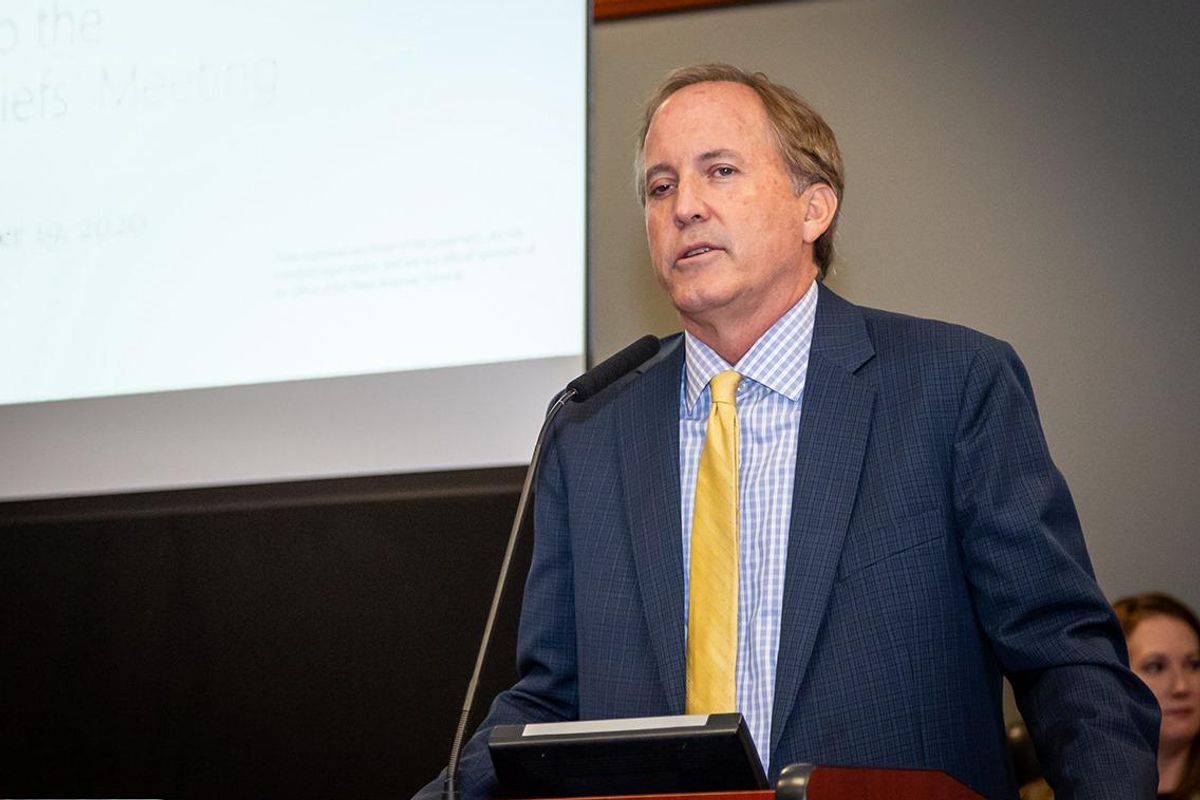
Texas Attorney General Ken Paxton
Late in April, the Texas Senate passed a new anti-abortion bill that opens the door to women being criminally prosecuted for obtaining an abortion — even in a different state.
Authored by Sen. Bryan Hughes, a Menola Republican, Senate Bill 2880 — titled the “Women and Child Protection Act” — ushers in a currently dormant 1925 abortion ban, and would be the first law in the country to allow pregnant women to be prosecuted for receiving abortion care.
“The most egregious point of SB 2880 is that it quietly revives Texas’s pre-Roe abortion ban by explicitly incorporating the 1925 law into the bill’s definition of criminal abortion law,” Sen. Carol Alvarado, a Houston Democrat, said during Senate debate over the bill on April 30.
“The 1925 law does not exclude women from prosecution and explicitly criminalizes ‘furnishing the means’ for an abortion — a vague clause that could be used to target those who assist abortion-related travel,” Alvarado added. “This bill will open the door to the criminalization of women seeking out-of-state abortions. The threat is not theoretical — it is written clearly into the text. This clause appears in no other abortion law currently on the books in Texas.”
In fact, the 1925 abortion ban is specifically referenced twice in SB 2880, Alvarado said.
Under SB 2880, for example, every one of the 35,000 Texas women who fled the state in 2023 to receive abortions in states where the care is legal could have been prosecuted.
Punishment for anyone breaking the 1925 abortion ban law is prison time of two to five years.
At a hearing for a similar bill — House Bill 44 from Rep. Charlie Geren, a Republican from Fort Worth — Texas attorney Elizabeth Myers testified that, “By explicitly referencing and defining Texas’s criminal abortion laws to include what has been called the 1925 ban, SB 2880 and (its companion House Bill) HB 5510 potentially re-animates a century-old abortion law that is currently void and unenforceable, as the Fifth Circuit Court of Appeals held in 2004.”
“The 1925 ban does not exempt pregnant Texans from prosecution for obtaining an abortion,” Myers said. “The 1925 ban also prohibits ‘furnishing the means’ for abortions. Multiple state actors, including the Texas attorney general, claim that vague phrase makes it a crime to help a pregnant woman leave the state to get an abortion.”
Attorney General Ken Paxton appeared to support this idea in 2022, after Roe v. Wade was overturned. Paxton wrote on X that the pre-Roe anti abortion statutes in Texas, which would include the 1925 law, were once again enforceable.
“Texas’s pre-Roe statutes criminalizing abortion is 100% good law, and I’ll ensure they’re enforceable,” Paxton wrote in the post. “Thankful for SCOTUS’s Dobbs decision paving the way to make Texas fully pro-life!”
A Texas House committee is now considering SB 2880. A companion bill in the House, HB 5510, had a hearing on April 25. HB 5510 already has support from more than a third of Republicans — all of whom have signed on as co-sponsors.
1925 abortion ban may be the end goal
The inclusion of two references to the 1925 ban in SB 2880 is especially noteworthy, according to experts, since the Texas Senate ended a bruising battle over the “Life of the Mother Act” — also known as SB 31 — one day before passing SB 2880.
SB 31 unanimously passed on April 29, with both Democratic and Republican support after language was inserted into the bill aiming to clarify when health care professionals can use an abortion to save a patient’s life.
Rep. Donna Howard, an Austin Democrat, told Courier Texas that she supports SB 31 because it could clear up confusion that doctors and hospital administrators have had about when they can legally perform abortions in medical emergencies.
Since the passage of the “Texas Heartbeat Act” in 2021, maternal mortality in Texas has skyrocketed by 56 percent, deadly sepsis cases among pregnant women have soared by 50 percent, infant mortality has increased by almost 13 percent and three miscarrying women have been documented to have died when they were denied timely treatment in hospital emergency rooms in Texas.
“I wouldn’t use the word ‘happy’ to describe my feelings,” Howard said about the Senate approving SB 31. ”This is not a ‘choice’ bill. It doesn’t address rape, incest, and fatal fetal abnormalities. I would love to do more, but we don’t have the votes.”
Texas voters have elected a Republican trifecta — GOP majorities in the state House and Senate, and a Republican governor — for the past 23 years.
“But it does clear up the confusion so that mothers can be saved,” Howard said about the bill. “We can’t let the perfect get in the way of the good…if this allows me to save the lives of Texas moms, I’m going to do that.”
The battle over the inclusion of the 1925 abortion law in SB 31 received public attention after several of the women who sued Texas in the Zurawski v. Texas lawsuit publicly lobbied against the possibility of women being criminalized and prosecuted for getting abortions as a result of passing the bill.
Amanda Zurawski, the lead plaintiff in the Zurawski case — which also sought to clarify medical exemptions — said that she was “grateful” that the eventual amendments to SB 31 included language noting that the bill was not intended to affirm that the 1925 ban could be used to prosecute pregnant women.
“This is a step in the right direction,” Zurawski said. “I’m grateful that our electeds listened to our concerns and worked on this bill. There’s a lot of bad legislation on the table and we have to be vigilant about it.”
One of the other Zurawski plaintiffs — Kaitlyn Kash, who lobbied lawmakers alongside Zurawski to amend SB 31 — said that she appreciated that Hughes, the bill’s author, listened to the women’s concerns.
“I like that there is now hard text saying that the bill is not meant for women to be prosecuted,” Kash said. “I feel comfortable no longer standing in the way of the bill.”
She, Zurawski and other fellow plaintiffs have formed advocacy group Free & Just, and plan to continue to warn women about bills that threaten their reproductive health care.
“Women wake up, this is your lives,” Kash said.
But neither she, Zurawski, or other members of Free & Just could have predicted that just one day after successfully removing some impediments for Texas women to receive medically necessary abortions, Hughes would refuse to take references to the 1925 ban out of SB 2880.
Alvarado told the Senate that her request to Hughes to remove the references to the 1925 abortion ban in SB 2880 had been “ignored.” She called SB 2880 a “backdoor effort” to fully reinstate the 1925 law, adding that the bipartisan passage of the amended SB 31 now “rings hollow.”
Sen. Sarah Eckhardt, a Democrat from Austin, told the Senate that while the changes in SB 31 were “a tiny step forward,” they were “followed immediately by this staggering hurdle backwards.”
What looms if the Texas Legislature passes SB 2880?
In addition to SB 2880 opening the door to pregnant women being prosecuted for getting abortions out of state or taking medication abortion pills, the bill also establishes a bounty allowing any private citizen in the country to civilly sue a person they suspect of helping a Texas woman leave the state to get an abortion.
The bill is also targeted at manufacturers and distributors of abortion pills and the doctors who prescribe them, even if they are located in states where abortion is legal.
Eckhardt accused Hughes and Republican supporters of SB 2880 of designing it to “isolate pregnant women and to threaten family friends, the organizations, lawyers and even judges that they might turn to for help, driving women into hiding, into secrecy and into another state where individual rights to self determination are still recognized.”
Hughes was not moved by pleas to delete references to the 1925 ban. He insisted that SB 2880, including its mentions of the 1925 abortion ban, was necessary in order to protect every “innocent and helpless” “unborn baby sleeping in their mother’s womb,” and also to “protect” Texas women from taking “poisonous” abortion pills from out of state.
Eckhardt mocked Hughes for purporting to “protect us little ladies.”
“I don’t feel protected, I feel attacked,” she said.
Sen. Molly Cook, a Democrat from Houston, urged Republicans to “stop trying to punish anyone who tries to help anyone assisting women trying to obtain autonomy over their bodies. And instead we should be doing everything to make pregnancy safe in Texas and to care for babies and children.”
With pregnant women in Texas having a 155% higher risk of dying than pregnant women in California, Cook asserted that “it is so unsafe to be pregnant in Texas.”
“They (Republican lawmakers) are trying to stop pregnant people from getting the care they need and they don’t care how they hurt people, even if that isolates people and prevents out-of-state physicians and clinics from providing care to Texans,” added Blake Rocap, legislative counsel for Avow, a nonprofit fighting for abortion access across Texas.
Rocap called the reference to the 1925 abortion ban in SB 2880 a “flashing red warning light about the anti-abortion movement’s plans.” Rocap warned of Attorney General Ken Paxton’s likely support of “ex-abusive partners” attempting to control pregnant Texans who need abortions through the civil bounty part of the law.
Bonnie Fuller is the former CEO and editor-in-chief of HollywoodLife.com and former editor-in-chief of Glamour, Cosmopolitan, Marie Claire, and USWeekly.
Reprinted with permission from Courier Texas.
- One Year After Landmark Abortion Ruling, Horrific Impact Is Mobilizing Voters ›
- Brain Drain: Why Smarter Workers Are Fleeing Red States For Blue ›
- New York City Advertising Abortion Access On Billboards In Southern Cities ›
- Texas Abortion Ban Almost Killed A Young Woman -- Now She's Fighting Back ›
- 'Collateral Damage': Texas Abortion Ban Is Killing Pregnant Women ›








